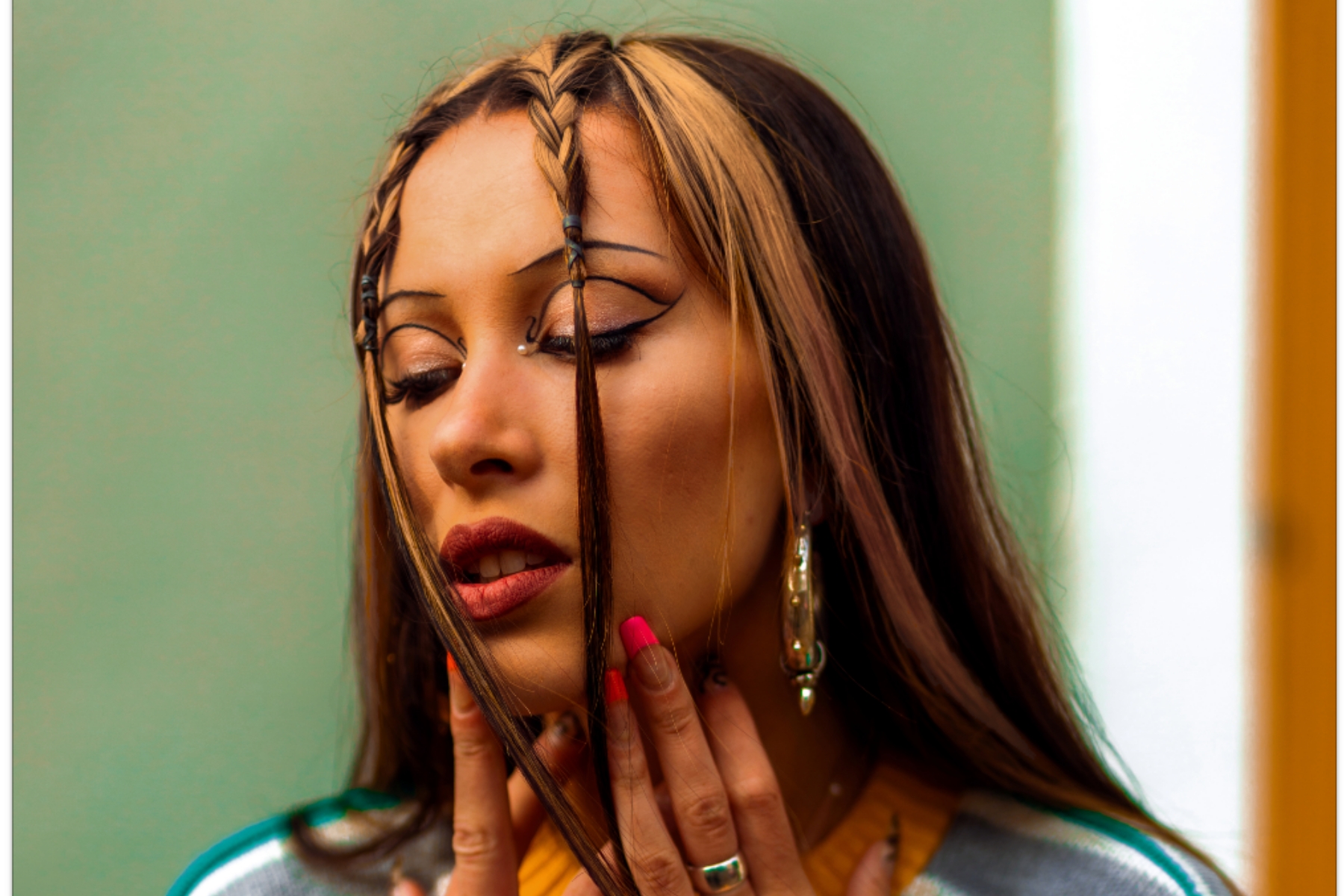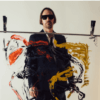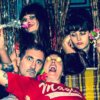Fable released her debut album Shame last week through Naim Records. A bold and inventive record that shape shifts through moods and big ideas of the Toxicity of an online world and consumer-driven society that shapes us. Devon-born artist Fable has carved out a world of searingly sharp pop songs that evocatively ripple with elements of trip-hop, alt-rock, and string-draped neo-soul, laden with personal and universal depths that intrigue and challenge at every turn. She talks to me lucidly and honestly about her life and artistry and the inspiration behind her work.
Signed to Naim Records, the label wing of the award-winning premium audio brand, and an ambassador for mental health charity My Black Dog, she has recorded a debut album of genre-fluid, brutally honest and darkly beautiful music that spans from urgent post-punk to introspective electronica, whilst posing questions that are both timely and personal.
“The demos and the initial kind of ideas were kind of sculpted in this little cottage in Wales up this mile dirt track,” Fable recalls of recording the album “You can hear nothing on roads, just have bird song, so that’s where my partner was living at the time studying in Lampeter. We had a really beautiful lockdown actually just lots of writing in a really beautiful space.” She explains.
“Then I’d say in between restrictions, I’d travel to London and get in the studio with my producer, Jonas, [Jonas Persson] and we would get the recording done. But it was such a kind of a weird process of kind of stop and start because of the pandemic; there were days that we could record, and days that we couldn’t, so the whole process took about a year and a half, two years – months at a time.”
Informed by the sounds she heard growing up in the ’90s from trip-hop and alt-rock to the naughties neo-soul of Amy Winehouse, ‘Orbiting’ and ‘Womb’ in particular are underpinned by a trippy electronic tapestry that allows Fable to mould her messages. “A lot of the tracks were kind of Danny’s kind of breakbeat tracks and kind of tried to turn them into something soft and beautiful. Then there’s also this trip-hop basis that a lot of it kind of stems from – especially ‘Orbiting’ and a few of the other tracks” She expands.
“It came from being a kid growing up in the ’90s. I think my mum always was listening to loads of like, dub, trip-hop, & and all those kinds of like and also a confusion with the world. That definitely seeps into the writing. My idea of what I saw myself doing in the future came from that place in the past that no longer exists anymore. I think that’s true for a lot of people in my generation, kind of like growing up in the ’90s, everything being very optimistic. Then this era of everything changing beyond a sort of imagination.”
The brilliant ‘Shame’ is underpinned by spindly-fingered synths, swaying beats and Fable’s excellent vocal juxtaposing verses that rifle through the overwhelming aspects of modern life and punctuate them with catchy exclamations. ‘Shame‘ laments the state of the world and the uphill battle her generation faces and is emphasised by a powerfully hyper-fake video that delves into themes of overconsumption, vanity and toxic media.
“I just find over the last few years, especially during the lockdown, I just feel like the unhealthiness that has been bred through smartphones in general and like the addictive nature of it and a self-obsession that people spiral into with it’s not healthy.” She tells me of the inspiration behind the song. “I feel like over time we’ve got to try to figure out a new focus because I think we’re wasting our time. Thinking about if we were to put as much energy into creating these realities in the real world, and putting on gigs and nights and events instead of doing everything and staging everything for the internet, it would be a lot more fun. I think that’s probably what my generation and those in the past, had a lot more fun doing.”
“That song came from a frustration with social media and the toxic algorithmic, that’s running through the whole media at the moment.” She continues “We’re starting to find out that narrating our reality is just really skewed. I wanted to bring some of those themes into the sort of forefront. I felt like we were living in this really fake, hyper-fake world and we reflected that in the video. Tied to that I really wanted to make it feel super disgustingly fake. Then also, in the middle of that track, visually, everything kind of shatters. the illusion is broken. These ideas are fuelled by overconsumption, I think we’re all just feeling a bit sick at the moment just like feeling sick with overconsuming our media and our failing capitalism. We’re living on a rubbish dump of ideas. In our culture at the moment, there’s always like this fake rebellion, but it almost feels like what punk was trying to do in the ’70s has now been so corporatised and some resold back to us it feels incredibly uncomfortable.”
Social media and the preponderance of streaming has also changed the terms of being an artist and how artists promote themselves; there’s an overwhelming pressure to be constantly promoting and available online “The discipline has completely changed writing music. Now, we are almost content creators, more than more musicians every day of our lives, it kind of feels like people are more focused today on the figures on their social media. It’s kind of easy to fall into that vein.” She continues. “I think a lot of artists have really taken to that really well and find innovative ways of promoting themselves. But for me, as a person and a musician, I’ve actually found that really hard, hard thing to get into I think the generations below me maybe will maybe find it more natural.”
“It’s not in equilibrium in people’s lives at the moment. I think it’s taken over, which is scary.” She warns of social media “It’s one of the best ways of getting your music out there and allowing your kind of fanbase to follow you figure out what you’re doing next. But yeah, it’s got its ups and downs. But I think it’s been the biggest challenge in getting this album out and also the idea that when you used to release music, you’d release something and then you’d promote it to a point, then you’d sort of go back into your shell as an artist, person and have a time away from that spotlight now you don’t.” Referencing the artists she has admired who retained an artistic mystery in the past “I’ve always admired people who did that. People like David Bowie and Kate Bush, and just the sort of mystical aspect of those kinds of characters. You really have to be constantly blowing your own trumpet these days.”
Last year Fable relaunched a career that had already included performing at Glastonbury and collaborating with Orbital. “It felt like, after such a long break, that I had, after working with Archive. Also, I lost a really good friend of mine so I had to have a bit of a break from music entirely for a couple of years.” She recalls, “Signing with Naim really gave me sort of fresh idea on I had to come back from that. Then, obviously, the pandemic hit. So that was fun. I think, in the end, we made a body of work.”
Fable returned with the trip-hop and neo-soul spinning ‘Orbiting’, that comes with a deeper attempt to make sense of the madness around us and a hyper-real video: “It was directed by Matt Hutchins who I contacted just as we were about to put out the first single; he’s actually done all of my videos. He’s someone that I kind of resonate with. Every time I explain an idea, and immediately kind of get it visually, we work really closely on meanings, songs and how we can, how we can pray that but in that particular video, a lot of thought kind of work went into that. I kind of wanted to capture that bit of time, through lockdown, with little things that were taken away in the world that were kind of getting to me that I wanted to highlight the symbolism and I think it resonated with a lot of people at the time.”
“I think you want to try and get as close to the truth of the world around us. And I think that, yeah, things have never really been so complicated.” She muses “I just wanted to observe this time, but we’re living in a bit of a film at the moment. So the geopolitical stuff that’s going on, it was kind of mimicking reality. I feel like with the isolation that the pandemic brought us I wanted to kind of highlight the breaking down of our communities and the polarising opinions thanks to this algorithm and kind of our sort of societies like alienation from any kind of human purpose anymore. As we’ve lost the strand that connects us to who we are a little bit in, in the symbolic world almost.”
Going off-grid and moving back to the country to the quietness of Wales out of the city of Brighton helped Fable reconnect with her surroundings and her spiritual side “I think going back to Wales and simpler living, moving away from Brighton and city life to start again… I think if you’ve always grown up in a city, it’s much harder to see the difference.” She confesses “But I grew up in Devon, I think life’s a lot slower. Sort of down this way, just like my childhood was spent in the countryside, in nature. A grounding of reality that comes before the symbolic world, which I feel like so many city kids just like have no access to. And like, the learning happens like before any of that was so crucial for me. I just felt like that’s like the tie that I have to the real reality, that tries to come from my music because I just felt so overwhelmed with the idea of living in a city and this kind of like a modern dystopia that we’ve created.”
“You have a reminder of people around you or people in your community. My friend Jamie was sort of living off the land with his mum and they grew their own vegetables, and it was like, ‘Oh, you can.’ There is a way you can live outside of like the bubble of madness, you know? Like, to have an example of somebody I knew in my life that was existing aside from it, kind of makes it not such a big deal to live without everything you are used to. But it’s scary.” She remembers, before explaining the very real financial and personal struggles she faced over the last few years “I spent most of that lockdown period with no hot water. I was on Universal Credit the whole time. I was living with my boyfriend, and it was a really difficult period actually because of the fact there were no gigs in the pipeline. It felt really impossible task at points because to be able to afford to get to London and it just felt very difficult right through the whole album, in terms of the practical side of it. But I think that comes through in the emotions on the record. I don’t know, I just felt like I desperately wanted to give it my best shot, but with some adversity involved, you know?”
Fable produces pop music but with an edge, it possesses alternative influences and depths, that exist outside of the sounds in the charts “I think the kind of pop I was after was the sort of the kind of thing that kind of came around slightly earlier with people like Goldfrapp. I’m trying to use a variety of sounds, but don’t want it to sound like you’re kind of average, like the kind of sounds that are being used in charts at the moment. She tells me “Every song in the chart is the same kind of plugins. The trends have become so distilled, that it’s almost like you don’t have very much creative breath in that sort of space. I just want to make music that gives me ‘the feels’, if you know what I mean?”
“I just wanted it to come from a place of authenticity of the kind of musicians that I’ve aspired to and who were a massive influence on me from day one, really. My childhood and rainbow album just affected me greatly. And people like Mac Miller who I just had on repeat during the lockdown period and I really felt it was something truly beautiful.”
“With the Lo-Fi thing that runs through it, but it also has a touch of kind of jazz classic, sort of, and maybe a little slice of a little slice of Amy, because she is like, the idol.” One can hear that on the enveloping gorgeous ‘Onion Brain‘ with its muted pianos, haunting jazzy croon and shuffling percussion.
It’s one of several shifts on the album from the welcoming opening tracks to the trippy elegant soundscapes to ‘Thirsty‘ with its Alanis-like shout-along chorus and chunky bar chords. She explains the trip her new long player Shame takes the listener on: “I wanted to create something that had a bit of dynamic and a bit a journey from the start of the album, I’ve spent a lot of time ordering the tracks because I thought that was really important for vinyl. I love the idea of having an album and playing it through like a body of work; it’s a kind of humbling sort of story that begins to evolve,” she enthuses. “But I think, in the beginning, it’s quite open. And there’s the first track is almost like a bit of a palette cleanser, it just sensitises you to like listening to the string arrangement and then you open to the next song. And I think there’s a bit of a journey that it goes on.”
“The themes of it at the beginning are quite innocent and there’s a learning that goes on, and it kind of gets a bit darker and slightly more interesting with avenues through the human psyche and understanding things through archetypes. Then, in the end, I think it comes back around to this peace with the song ”Onion Brain. It had to be the final track because I just think it felt so almost like making peace with yourself before the record stops, the whole thing is kind of like a little lifecycle.”
Shame is out now on Naim records.




